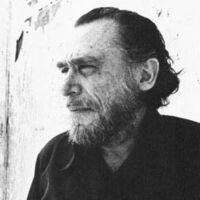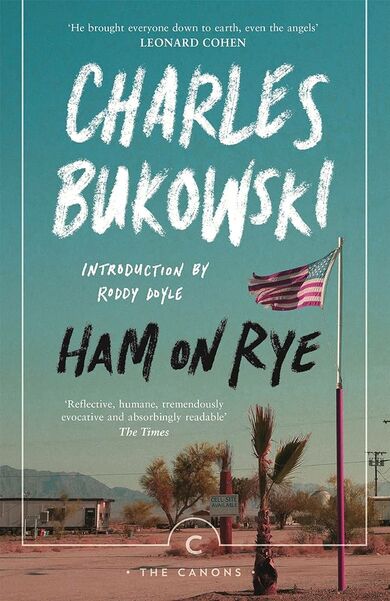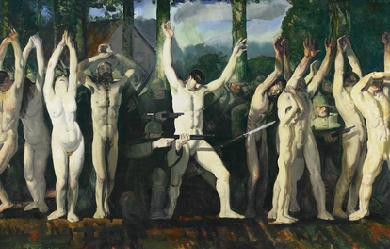Ham on Rye: 55
A couple of nights later Becker walked in. I guess my parents gave him
my address or he located me through the college. I had my name and address listed with the employment division at the college, under “unskilled labor.”
“I will do anything honest or otherwise,” I had written on my card. No
calls.
Becker sat in a chair as I poured the wine. He had on a Marine uniform.
“I see they sucked you in,” I said.
“I lost my Western Union job. It was all that was left.”
I handed him his drink. “You’re not a patriot then?”
“Hell no.”
“Why the Marines?”
“I heard about boot camp. I wanted to see if I could get through it.”
“And you did.”
“I did. There are some crazy guys there. There’s a fight almost every
night. Nobody stops it. They almost kill each other.”
“I like that.”
“Why don’t you join?”
“I don’t like to get up early in the morning and I don’t like to take
orders.”
“How are you going to make it?”
“I don’t know. When I get down to my last dime I’ll just walk over to
skid row.”
“There are some real weirdos down there.”
“They’re everywhere.”
I poured Becker another wine.
“The problem is,” he said, “that there’s not much time to write.”
“You still want to be a writer?”
“Sure. How about you?”
“Yeah,” I said, “but it’s pretty hopeless.”
“You mean you’re not good enough?”
“No, they’re not good enough.”
“What do you mean?”
“You read the magazines? The 'Best Short Stories of the Year’ books? There are at least a dozen of them.”
“Yeah, I read them . . .”
“You read The New Yorker” Harper’s? The Atlantic?”
“Yeah ...”
“This is 1940. They’re still publishing 19th Century stuff, heavy,
labored, pretentious. You either get a headache reading the stuff or you
fall asleep.".
“What’s wrong?”
“It’s a trick, it’s a con, a little inside game.”
“Sounds like you’ve been rejected.”
“I knew I would be. Why waste the stamps? I need wine.”
“I’m going to break through,” said Becker. “You’ll see my books on the library shelves one day.”
“Let’s not talk about writing.”
“I’ve read your stuff,” said Becker. “You’re too bitter and you hate everything.”
“Let’s not talk about writing.”
“Now you take Thomas Wolfe . . .”
“God damn Thomas Wolfe! He sounds like an old woman on the telephone!” “O.K., who’s your boy?”
“James Thurber.”
“All that upper-middle-class folderol . . .”
“He knows that everyone is crazy.”
“Thomas Wolfe is of the earth . . .”
“Only assholes talk about writing . . .”
“You calling me an asshole?”
“Yes ...”
I poured him another wine and myself another wine.
“You’re a fool for getting into that uniform.”
“You call me an asshole and you call me a fool. I thought we were
friends.”
“We are. I just don’t think you’re protecting yourself.”
“Every time I see you you have a drink in your hand. You call
that protecting yourself?”
“It’s the best way I know. Without drink I would have long ago cut my god-damned throat.”
“That’s bullshit.”
“Nothing’s bullshit that works. The Pershing Square preachers have
their God. I have the blood of my god!”
I raised my glass and drained it.
“You’re just hiding from reality,” Becker said.
“Why not?”
“You’ll never be a writer if you hide from reality.”
“What are you talking about? That’s what writers do.'”
Becker stood up. “When you talk to me, don’t raise your voice.”
“What do you want to do, raise my dick?”
“You don’t have a dick!”
I caught him unexpectedly with a right that landed behind his ear. The
glass flew out of his hand and he staggered across the room. Becker was a powerful man, much stronger than I was. He hit the edge of the dresser, turned, and I landed another straight right to the side of his face. He staggered over near the window which was open and I was afraid to hit him then because he might fall into the street.
Becker gathered himself together and shook his head to clear it.
“All right now,” I said, “let’s have a little drink. Violence nauseates
me.”
“O.K.,” said Becker.
He walked over and picked up his glass. The cheap wine I drank didn’t
have corks, the tops just unscrewed. I unscrewed a new bottle. Becker held out his glass and I poured him one. I poured myself one, set the bottle
down. Becker emptied his. I emptied mine.
“No hard feelings,” I said.
“Hell, no, buddy,” said Becker, putting down his glass. Then he dug a
right into my gut. I doubled over and as I did he pushed down on the back of my head and brought his knee up into my face. I dropped to my knees, blood running from my nose all over my shirt.
“Pour me a drink, buddy,” I said, “let’s think this thing over.”
“Get up,” said Becker, “that was just chapter one.”
I got up and moved toward Becker. I blocked his jab, caught his right
on my elbow, and punched a short straight right to his nose. Becker stepped back. We both had bloody noses.
I rushed him. We were both swinging blindly. I caught some good shots.
He hit me with another good right to the belly. I doubled over but came up
with an uppercut. It landed. It was a beautiful shot, a lucky shot. Becker lurched backwards and fell against the dresser. The back of his head hit the mirror. The mirror shattered. He was stunned. I had him. I grabbed him by
the shirt front and hit him with a hard right behind his left ear. He
dropped on the rug, and knelt there on all fours. I walked over and
unsteadily poured myself a drink.
“Becker,” I told him, “I kick ass around here about twice a week. You
just showed up on the wrong day.”
I emptied my glass. Becker got up. He stood a while looking at me. Then
he came forward.
“Becker,” I said, “listen . . .”
He started a right lead, pulled it back and slammed a left to my mouth.
We started in again. There wasn’t much defense. It was just punch, punch, punch. He pushed me over a chair and the chair flattened. I got up, caught
him coming in. He stumbled backwards and I landed another right. He crashed backwards into the wall and the whole room shook. He bounced off and landed a right high on my forehead and I saw lights: green, yellow, red . . . Then
he landed a left to the ribs and a right to the face. I swung and missed.
God damn, I thought, doesn’t anybody hear all this noise? Why
don’t they come and stop it? Why don’t they call the police?
Becker rushed me again. I missed a roundhouse right and then that was
it for me . . .
When I regained consciousness it was dark, it was night. I was under
the bed, just my head was sticking out. I must have crawled under there. I was a coward. I had puked all over myself. I crawled out from under the bed. I looked at the smashed dresser mirror and the chair. The table was
upside down. I walked over and tried to set it upright. It fell over. Two of
the legs wouldn’t hold. I tried to fix them as best I could. I set the table
up. It stood a moment, then fell over again. The rug was wet with wine and puke. I found a wine bottle lying on its side. There was a bit left. I drank
that down and then looked around for more. There was nothing. There was nothing to drink. I put the chain on the door. I found a cigarette, lit it
and stood in the window, staring down at Temple Street. It was a nice night out.
Then there was a knock on the door. “Mr. Chinaski?” It was Mrs. Kansas.
She wasn’t alone. I heard other voices whispering. She was with her little
dark friends.
“Mr. Chinaski?”
“Yes?”
“I want to come into your room.”
“What for?”
“I want to change the sheets.”
“I’m sick now. I can’t let you in.”
“I just want to change the sheets. I’ll be just a few minutes.”
“No, I can’t let you in. Come in the morning.”
I heard them whispering. Then I heard them walking down the hall. I
went over and sat on the bed. I needed a drink, bad. It was a Saturday
night, the whole town was drunk. Maybe I could sneak out?
I walked to the door and opened it a crack, leaving the chain on, and I
peeked out. At the top of the stairway there was a Filipino, one of Mrs.
Kansas’ friends. He had a hammer in his hand. He was down on his knees. He looked up at me, grinned, and then pounded a nail into the rug. He was pretending to fix the rug. I closed the door.
I really needed a drink. I paced the floor. Why could everybody in the
world have a drink but me? How long was I going to have to stay in that god– damned room? I opened the door again. It was the same. He looked up at me, grinned, then hammered another nail into the floor. I closed the door.
I got out my suitcase and began throwing my few clothes in there. I
still had quite a bit of money I had won gambling but I knew
that I could never pay for the damages to that room. Nor did I want to.
It really hadn’t been my fault. They should have stopped the fight. And
Becker had broken the mirror . . .
I was packed. I had the suitcase in one hand and my portable typewriter
in its case in the other. I stood in front of the door for some time. I
looked out again. He was still there. I slipped the chain off the door. Then
I pulled the door open and burst out. I ran toward the stairway.
“HEY! Where you go?” the little guy asked. He was still down on
one knee. He started to raise his hammer. I swung the portable typewriter
hard against the side of his head. It made a horrible sound. I was down the steps and through the lobby and out the door.
Maybe I had killed the guy.
I started running down Temple Street. Then I saw a cab. He was empty. I leaped in.
“Bunker Hill,” I said, “fast!”






